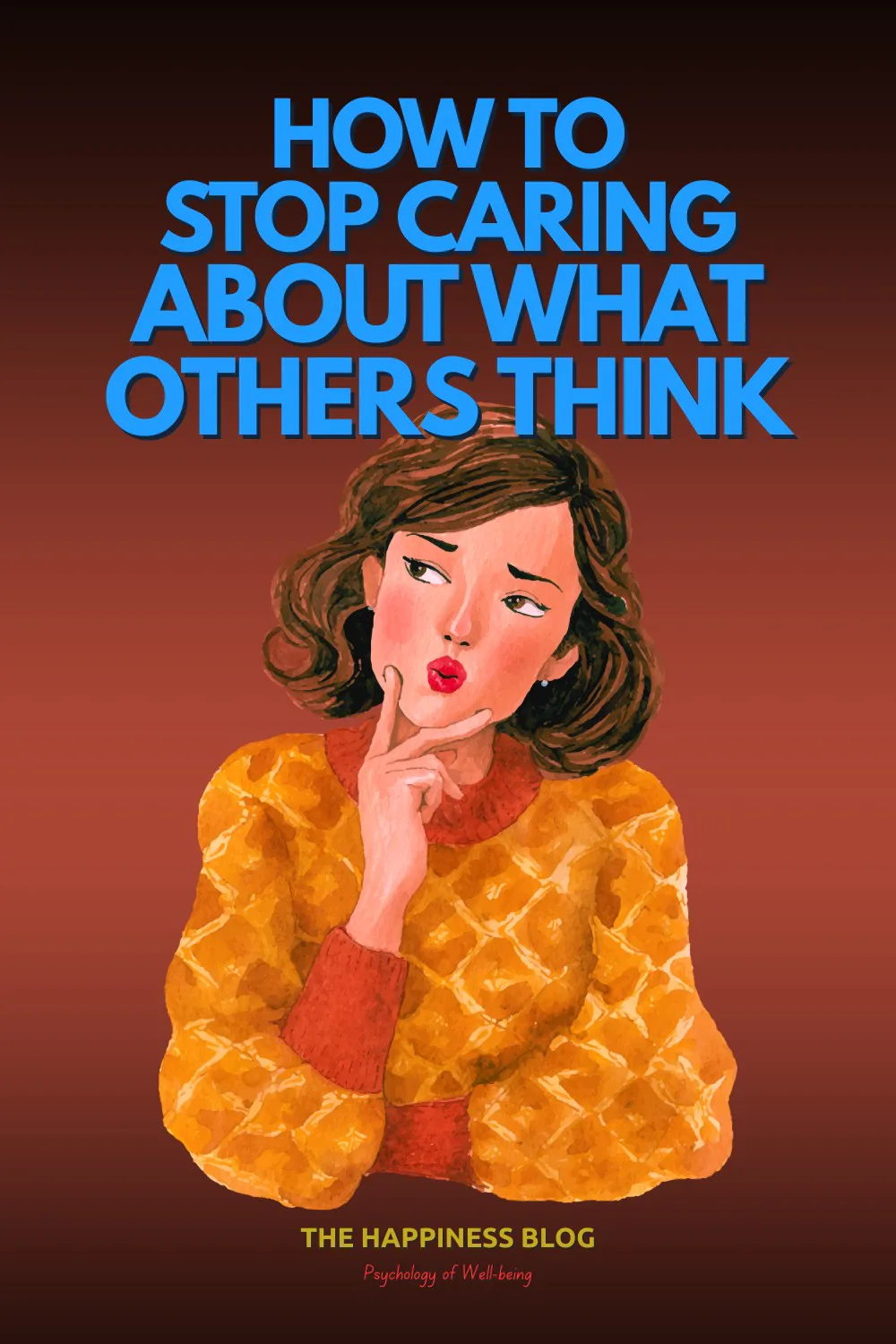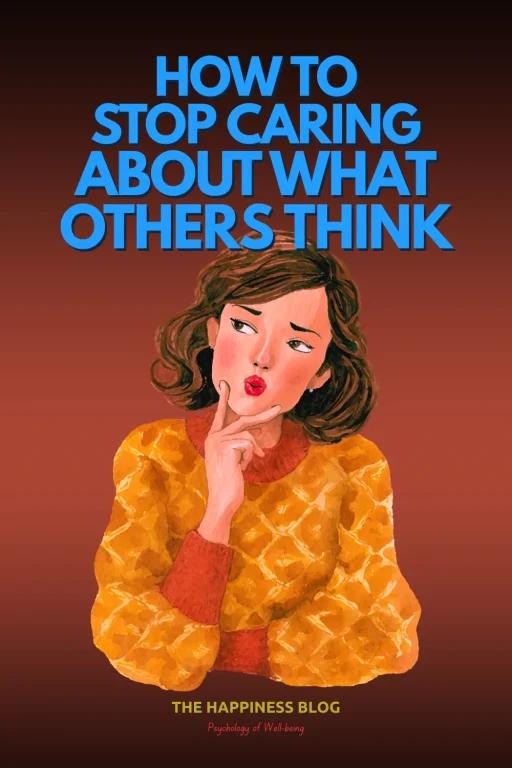Today's Sunday • 10 mins read
“Stop being so concerned about what people think of you. People aren’t thinking about you nearly as much as you think they are.” – Inner Practitioner
You must have read or heard that above. But how do you finally stop caring what others think about you?
You’re sitting at home, replaying a conversation from three hours ago. Did you sound stupid? Was your joke inappropriate?
You check your phone for the fifth time, wondering why they haven’t replied to your text yet. Your mind runs many terrible possibilities.
That is exhausting. You know it. Yet you keep doing it.
Here’s how to fix that.
7 Powerful Mindshifts To Stop Caring What Others Think
No matter what you do, some people will always criticize. By caring about every opinion equally, you give strangers and semi-strangers the same voting power in your life as you and your closest people.
Here are some powerful mindset shifts to help you stop living for other people’s opinions.
1. Realize That The Equation Is Unsolvable
It’s simple: caring about everyone’s opinion is an unsolvable equation.
“You could be the ripest, juiciest peach in the world, and there’s still going to be someone who hates peaches.” — Dita Von Teese
Each person holds a different blueprint of who you “should” be.
- Person A wants you to be confident and outspoken. B finds you aggressive and narcissistic.
- C thinks you should dress more professionally. And D tells others you’re uptight.
- Then E wants you to be more available, while F thinks you’re needy.
Trying to please everyone is just not doable. It’s a psychological tap that drains your energy and drifts you away from your authentic self.
So stop letting other people’s filtered perceptions drive your life’s narrative.
You can’t be everything to everyone.

The truth is stark: Your time is finite, around 80 summers. Don’t lose those years to people who don’t matter.
Allocate your caring budget to a few trusted people and stop funding everyone else’s judgment bank.
Write this down somewhere you’ll see it: “I cannot please everyone, and trying to do so guarantees I’ll please no one, including myself.”
2: Your Brain May Be Lying To You
Your mind could be telling you that everyone is watching and judging you. That’s called the spotlight effect.

The spotlight effect is a cognitive bias that makes you believe you’re the main character in everyone else’s story.
But actually, you’re not. You’re a supporting character at best, an extra in most scenes.
Start catching yourself when the spotlight effect kicks in.
Most people are too busy in their own lives to worry about your life. They do not have that much mental energy to spare on you.
That embarrassing thing you said last week? Nobody remembers it. They were too busy replaying their own awkward moment.
“We would worry less about what others think of us if we realized how seldom they do.” — Ethel Barrett
When you think “everyone will notice this,” pause and ask: “Will they really? Or am I overestimating how much attention they’re paying?” The answer is almost always the latter.
3: Make Your List of Trusted Critics
Not all opinions carry equal weight. Your doctor’s opinion about your health matters. Random internet strangers’ opinions about your life choices don’t.
Right now, grab paper or open a note on your phone. Write down five to ten people who earn the right to influence your decisions.
These should be people who:
- Know you well
- Have your best interests at heart
- Have demonstrated good judgment themselves
- Have earned your trust over time
Your partner. Your best friend. Your mentor. Maybe a sibling or parent who gets you. That colleague whose advice has proven solid.
Everyone else? They go in the “interesting but irrelevant” category.
When someone outside this circle offers unsolicited opinions, acknowledge them politely and move on. You don’t need to defend yourself. You don’t need to explain.
“Thanks for sharing your perspective” works fine.
This list becomes your filter. When you catch yourself worrying about what someone thinks, check: are they on the list? No? Then their opinion doesn’t get a vote.
Keep this list somewhere accessible. Your phone’s notes app. A sticky note on your desk. Somewhere, you can reference it when doubt creeps in.
Review it every few months. People earn their way on. People can lose their spot if trust breaks down. The list isn’t permanent, but it should be small.
4: Ask The Last Question
Will any of this matter when you’re 80?
Will you remember the person who side-eyed your outfit in 2025? Will you regret not worrying more about what your colleague thought of your presentation?
No.
You’ll regret the opportunities you didn’t take.
The trips you skipped because someone might judge you for traveling alone. The career change you avoided because people would talk. The relationship you stayed in because of what others would say.
Make this practical. When you’re about to avoid something because of potential judgment, stop. Ask yourself:

If the answer is yes, you know what to do.
The last question test isn’t morbid. It’s clarifying. It separates what matters from what doesn’t.
Try this: write down three things you’re currently avoiding because of what others might think. It could be a conversation you need to have. A job application you haven’t submitted. A creative project you’re hiding.
Now run each one through the last question test. Which ones will you regret not doing?
Start with one. Do it this week.
The regret of not trying always outlasts the temporary discomfort of judgment.
5: Start Daily Micro-Rebellions
Big changes start with small actions. Pick one tiny thing each day where you prioritize your preference over potential judgment.
- Monday: Wear the outfit you like but think others might judge. Tuesday: Post something online without overthinking it.
- Wednesday: Say no to an invitation without crafting the perfect excuse. Thursday: Order what you want at the restaurant instead of what seems “normal.”
- Friday: Share an opinion you usually keep quiet about. Saturday: Draw an emotion you are feeling today.
Each tiny act builds evidence that the world doesn’t end when you prioritize your preferences. The feedback loop shifts. You do the thing, nothing terrible happens, your confidence grows, you do more things.
“Don’t let the noise of others’ opinions drown out your own inner voice.” — Steve Jobs
Most rebellions don’t require grand gestures. They require consistent small choices.
Keep a running list. Put it in your phone under “Rebellions” or “Things I Did Anyway.” Watch it grow.
Week one might have five entries. Week four might have twenty. By month three, you’ll stop counting because not caring becomes your default.
That list is proof you’re changing. On days when you feel stuck, scroll through it. Look at all the times you worried something would happen, and it didn’t.
The micro-rebellions aren’t about being reckless. They’re about recalibrating your sense of risk. What you think will cause disaster usually causes nothing at all.
6: Let Discomfort Pass Without Acting
Feeling uncomfortable when someone disapproves doesn’t mean you need to change course. It means you’re human.
Your nervous system evolved to keep you safe within your tribe. Social rejection from your tribe in pre-modern times meant the end of existence.
Now, at maximum, it may mean someone on social media thinks you made a questionable move in your life or career.
The discomfort is information about your wiring, not evidence that you’re wrong.
“Care about what other people think and you will always be their prisoner.” — Lao Tzu
Here’s what to do when that uncomfortable feeling hits: sit with it. Notice it. Name it.
“I’m feeling anxious because I think Sarah disapproves of my decision.”
Then let it pass without acting on it. The feeling will fade. Your decision can stand.
You don’t have to act on every feeling.
Practice this: when discomfort shows up, wait 24 hours before responding or changing course. Set a reminder on your phone if you need to.
Most of the time, the urgency to “fix” how others see you will evaporate. The anxiety peaks, then drops. By hour 12, you’ll care less. By hour 24, you’ll wonder why it bothered you at all.
Track this. Note when the discomfort hits and when it fades. You’ll see the pattern. The feeling always passes. Your impulse to react causes more problems than the original judgment ever could.
7: Design Your Own Scoreboard
Stop using other people’s metrics to measure your success.
If you’re tracking your worth based on likes, promotions, or social approval, you’re playing a game where the rules keep changing, and you never win.
Create your own definition. Sit down right now and write answers to these questions:
- What makes a day good for me?
- What makes me proud of myself?
- What values do I want to live by?
- What would I do if I knew no one was watching?
Be specific. “A good day” might mean: worked on my novel for an hour, had a real conversation with my kid, moved my body, ate food that made me feel good.
Not: got 100 likes on a post, impressed my boss, looked busy in meetings.
These answers should come from you. Not from what you think you should want based on what others value.
When you know your own scoreboard, other people’s opinions become interesting data points rather than verdicts you must accept.
Someone thinks you’re making a mistake? That’s one data point. But your scoreboard shows you’re aligned with your values and moving toward your definition of success. Their opinion doesn’t override your metrics.
Put your scoreboard somewhere visible. Desktop background. Journal. Bathroom mirror. Somewhere you’ll see it when doubt creeps in.
Review it monthly. Adjust it as you learn more about yourself. Make sure it stays yours.
When you’re clear on what you’re measuring, other people’s scorecards lose their power. They’re playing a different game. You don’t need to compete.
Final Words
You know what narcissists do? They inferiorize others to feel superior.
So, if you know a narcissist, notice how frequently they judge you to feel good themselves.
But what they say of you is actually a reflection of their issues, not your worth. That’s called narcissistic projection.
Stop trying to correct their version of you. Simply check out mentally from their presence. Protect your peace instead.
I read somewhere:
“Unsolicited opinions are criticisms. Change my mind.”
So don’t give others uncalled-for opinions. And don’t waste a minute on other people’s opinions.
Ig nore them or say, “Thanks for your input. I’m going to do what feels right for me.”
If you’re scared to do something because of what others might think, do it scared. You’ll probably find nobody was watching.
Practice not checking for reactions. String enough of those moments together and you’ll have built a life that’s truly yours.
“The eyes of others our prisons; their thoughts our cages.” — Virginia Woolf
Start making choices purely because you want to. Try it today.
√ Also Read: 12 Behaviors That Strongly Suggest You Lack Self-Discipline
√ Please share this if you found it helpful.
» You deserve happiness! Choosing therapy could be your best decision.
...
• Disclosure: Buying via our links earns us a small commission.

